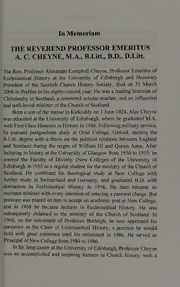
In Memoriam: The Reverend Professor Emeritus A. C.Cheyne, M.A., B.Litt, B.D., D.Litt PDF
Preview In Memoriam: The Reverend Professor Emeritus A. C.Cheyne, M.A., B.Litt, B.D., D.Litt
Memoriam In THE REVEREND PROFESSOR EMERITUS CHEYNE, A. C. M.A., B.Litt., B.D., D.Litt. The Rev. Professor Alexander Campbell Cheyne, Professor Emeritus of Ecclesiastical History at the University of Edinburgh and Honorary President of the Scottish Church History Society, died on 31 March 2006 in Peebles in his eighty-second year. He was a leading historian of Christianity in Scotland, a renowned scholar-teacher, and an influential and well-loved minister ofthe Church ofScotland. Bom a son ofthe manse in Kirkcaldy on 1 June 1924, Alec Cheyne was educated at the University ofEdinburgh, where he graduated M.A. with First Class Honours in History in 1946. Following military service, he pursued postgraduate study at Oriel College, Oxford, earning the B.Litt. degree with a thesis on the political relations between England and Scotland during the reigns of William III and Queen Anne. After lecturing in history at the University ofGlasgow from 1950 to 1953, he entered the Faculty of Divinity (New College) of the University of Edinburgh in 1953 as a regular student for the ministry ofthe Church of Scotland. He combined his theological study at New College with further study in Switzerland and Germany, and graduated B.D. with distinction in Ecclesiastical History in 1956. He then became an assistant minister with every intention ofentering a pastoral charge. But pressure was placed on him to accept an academic post at New College, and in 1958 he became lecturer in Ecclesiastical History. He was subsequently ordained to the ministry of the Church of Scotland. In 1964, on the retirement of Professor Burleigh, he was appointed his successor to the Chair of Ecclesiastical History, a position he would hold with great eminence until his retirement in 1986. He served as New Principal of College from 1984 to 1986. In his long career at the University of Edinburgh, Professor Cheyne was an accomplished and inspiring lecturer in Church history, with a 2 In Memoriam unique ability to draw his students into a past world, and to breathe life into its personalities and debates. His lectures were beautifully written, infused with empathy for the human condition and rich in analysis. In leading more informal seminar and tutorial discussions, he communicated his interest in the past in a quiet but compelling manner, while enlivening his classes with his gentle sense of humour. His impressive breadth of knowledge, while never used simply to impress, was always there, to be drawn upon by his students. He could lecture on — a wide range ofsubjects, from the early Church to the present though he was particularly at home when lecturing in Scottish religious history and modern British religious history since the seventeenth century. One of Professor Cheyne’s great achievements was to build a vibrant department by recruiting lecturers of ability and commitment. This was the famed ‘Cheyne gang’, of David Wright in early Church history, Peter Mathieson in Reformation history, and Andrew Ross in the history of Christian missions. Under his leadership, this Department of Ecclesiastical History was probably the best in the United Kingdom in talent and breadth ofcoverage. Professor Cheyne’s scholarly interest in Victorian Scotland found expression in The Transforming of the Kirk: Victorian Scotland’s Religious Revolution (1983). This remains the definitive study of the fundamental changes in the Scottish Presbyterian creeds, interpretation of Scripture, practice of worship and social engagement during the nineteenth century. His long-standing fascination with Thomas Chalmers led to an edited volume of essays, The Practical and the Pious: Essays on Thomas Chalmers (1985), based on the proceedings of a conference that he organised. His introduction to that volume provides the best short study of Chalmers to be found anywhere. His Studies in Scottish Church History brought together a number of his seminal essays, ranging broadly from the Reformation to the present. As an historian, he was firmly rooted in the tradition of liberal historiography, with its emphasis on the importance of individual human actors, on the potential for human progress, and on respect for human freedom. A. C. Cheyne 3 He served as Vice-President ofthe Scottish Church History Society in 1987-88, President ofthe Society in 1988-89, and Honorary President from 2000 to 2006. He regularly attended meetings of the Society, travelling up from his home in Peebles, until his failing health made this — increasingly difficult. He gave the Society two memorable papers an important paper on the Westminster Confession in Scottish Church history, and a superb Presidential address on the life and work of the Victorian Church of Scotland leader, John Tulloch. Over the years, his comments on papers presented to the Society were always insightful and stimulating. He will be greatly missed by our society and we extend our sympathy to his sister-in-law, Mary Cheyne, and to his many friends and former students. S.J.B.
